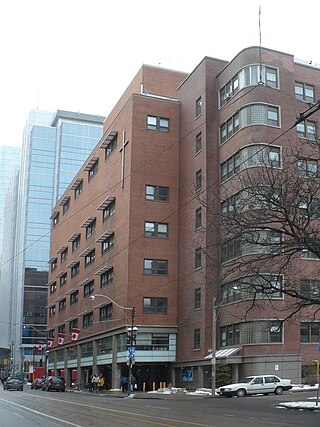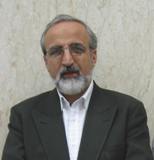
Gastroenterology is the branch of medicine focused on the digestive system and its disorders. The digestive system consists of the gastrointestinal tract, sometimes referred to as the GI tract, which includes the esophagus, stomach, small intestine and large intestine as well as the accessory organs of digestion which include the pancreas, gallbladder, and liver.

Tomica Milosavljević is a Serbian doctor and politician. He served as Minister of Health in the Government of Serbia under four Prime Ministers with the total span of seven years. He is also employed as a full professor at the University of Belgrade and works in the Clinical Centre of Serbia in Belgrade.
Ioan Puşcaş was a Romanian gastroenterologist, born in Treznea, Sălaj. In the 1970s, he proposed the use of carbonic anhydrase (CA) inhibitor acetazolamide to heal peptic ulcers.

St. Michael's Hospital is a teaching hospital and medical centre in Toronto, Ontario, Canada. It was established by the Sisters of St. Joseph in 1892 with the founding goal of taking care of the sick and the poor of Toronto's inner city. The hospital provides tertiary and quaternary services in cardiovascular surgery, neurosurgery, inner city health, and therapeutic endoscopy. It is one of two Level 1 adult trauma centres in Greater Toronto, along with the larger Sunnybrook Health Sciences Centre. As trauma centres, both St. Michael's and Sunnybrook are equipped with helipads. It is one of several teaching hospitals of the University of Toronto Faculty of Medicine and is part of the Unity Health Toronto hospital network.

Reza Malekzadeh is an Iranian medical scientist and gastroenterologist.

Hironori Yamamoto is a Japanese gastroenterologist and academic best known for inventing double-balloon enteroscopy (DBE), a technique that enables detailed visualization and treatment of the small intestine by endoscopy. His work has significantly advanced the field of endoluminal therapeutic endoscopy.

Hashem B. El-Serag is a Palestinian-American physician and medical researcher best known for his research in liver cancer, hepatocellular carcinoma (HCC) and the hepatitis C virus. He serves as the Margaret M. and Albert B. Alkek Chairman of the Department of Medicine at Baylor College of Medicine as well as the co-director of the Texas Medical Center Digestive Disease Center. El-Serag previously served as president of the American Gastroenterological Association and Editor-in-Chief of Clinical Gastroenterology and Hepatology.
Blair S. Lewis, M.D., F.A.C.P., F.A.C.G., is an American board-certified gastroenterologist and Clinical Professor of Medicine at the Mount Sinai School of Medicine. Lewis is a specialist in the field of gastrointestinal endoscopy and was the primary investigator for the first clinical trial of capsule endoscopy for the small intestine and also the first clinical trial of capsule endoscopy for the colon.

Dame Parveen June Kumar is a British doctor who is a Professor of Medicine and Education at Barts and The London School of Medicine and Dentistry. She worked in the NHS for over 40 years as a consultant gastroenterologist and physician at Barts and the London Hospitals and the Homerton University Hospital. She was the President of the British Medical Association in 2006, of the Royal Society of Medicine from 2010 to 2012, of the Medical Women's Federation from 2016 to 2018 and of the Royal Medical Benevolent Fund from 2013 to 2020. She was also Vice President of the Royal College of Physicians from 2003 to 2005. In addition, she was a founding non-executive director of the National Institute of Clinical Excellence, chaired the Medicines Commission UK until 2005, and also chaired the BUPA Foundation Charity for Research until 2013.
Pediatric gastroenterology developed as a sub-specialty of pediatrics and gastroenterology. It is concerned with treating the gastrointestinal tract, liver and pancreas of children from infancy until age eighteen. The principal diseases it is concerned with are acute diarrhea, persistent vomiting, gastritis, and problems with the development of the gastric tract.
Philip Augustine, an Indian gastroenterologist, specialist in gastrointestinal endoscopy and a hospital administrator from Ernakulam, Kerala. He founded the Lakeshore Hospital and Research Centre in 2003. In 2010, the Government of India honoured him with the Padma Shri, for his services to the fields of medicine.
Amit Prabhakar Maydeo is an Indian gastroenterologist and endoscopy expert known for his pioneering efforts on therapeutic endoscopy and endoscopic retrograde cholangiopancreatography (ERCP). In 2013, he was honoured by the Government of India with the Padma Shri, the fourth highest civilian award, for his contributions to the fields of medicine and medical education. His son, Dr. Rohan Maydeo, is a surgeon from MGM Medical College and Hospital, Aurangabad.
Badri Nath Tandon was an Indian gastroenterologist, hepatologist, medical researcher and academic, and the Chairman and Senior Consultant of Gastroenterology, at Metro Hospitals and Heart Institute, Noida. He is a former Professor and Head of Department of Gastroenterology and Human Nutrition Unit at the All India Institute of Medical Sciences, Delhi (AIIMS) and a former Director and Senior Consultant of Hepatology and Gastroenterology at Pushpawati Singhania Research Institute for Liver, Renal and Digestive Diseases, New Delhi. He is a recipient of several awards including Sasakawa WHO Health Prize and Jubilee Medal of the RAMS. The Government of India awarded him the third highest civilian honour of the Padma Bhushan, in 1986, for his contributions to medicine.
Thoguluva Shesadri Chandrasekar is an Indian gastroenterologist and the founder chairman of Medindia Hospitals, a healthcare facility based in Chennai. He is credited with the performance of over 23,000 endoscopy procedures and is known for the Braille chart on personal hygiene he prepared in 2015 for the visually impaired people. The Government of India awarded him the fourth highest civilian honour of the Padma Shri, in 2016, for his contributions to medicine.
John Gordon Williams is a British health services researcher and clinical academic gastroenterologist. He led the establishment of the Postgraduate Medical School in Swansea, created and developed the Health Informatics Unit at the Royal College of Physicians, and was the founding president of WAGE, the Welsh Association for Gastroenterology and Endoscopy Williams was appointed a CBE for services to medicine in 2014.

Todd Huntley Baron is an American gastroenterologist who is Professor of Medicine at the University of North Carolina School of Medicine. Additionally, he currently serves as the Director of Advanced Therapeutic Endoscopy within UNC's Division of Gastroenterology and Hepatology. He is known for his publishing in the field of gastroenterology particularly in endoscopic retrograde cholangiopancreatography (ERCP), endoscopic ultrasound (EUS) and other advanced endoscopic procedures. He has developed interventional endoscopic techniques for the care of patients with gastrointestinal, liver and other medical conditions. He was the first to describe endoscopic drainage of the gallbladder, placement of a colonic stent, and endoscopic pancreatic necrosectomy.

Michel Kahaleh is an American gastroenterologist and an expert in therapeutic endoscopy.

Mamun Al Mahtab is a Bangladeshi doctor, hepatologist, medical scientist, and author. With 290 publications in national and international peer-reviewed journals to his credit, Mahtab works as the Head, Division of Interventional Hepatology, Bangabandhu Sheikh Mujib Medical University (BSMMU).

Nib Soehendra is a German surgeon known for numerous contributions to the field of endoscopy and therapeutic endoscopy.

Kenneth Frank Binmoeller is a medical doctor and author of multiple scientific contributions and over 300 publications, as well as the inventor of the lumen-apposing metal stent (LAMS) and AXIOS System. These are medical devices used to relieve blockages while creating a direct connection between two bodily structures. He practices in the field of Gastroenterology with a specialty of Advanced Endoscopic Intervention. Binmoeller has been published for his innovations in medical devices and training in the field of Endoscopy.












